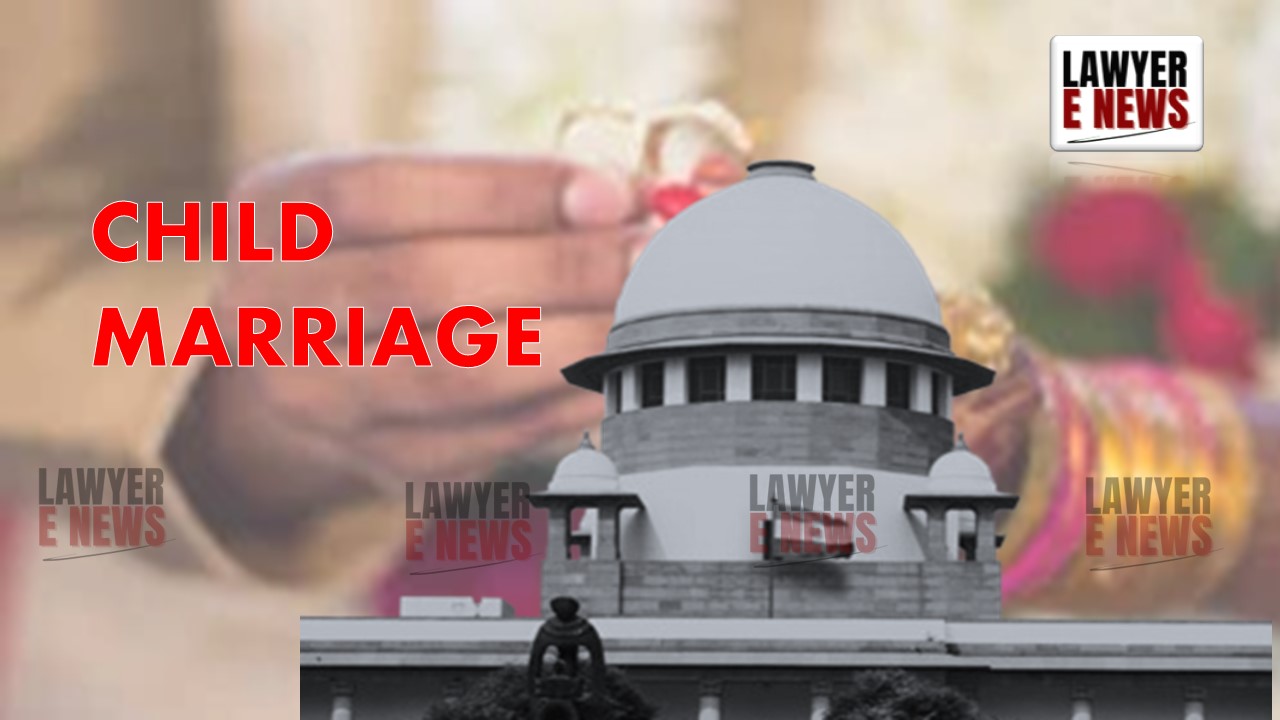-
by Admin
15 February 2026 5:35 AM



"Child marriage deprives children of their agency, autonomy and right to fully develop and enjoy their childhood." In a Landmark judgement, the Supreme Court of India issued a significant ruling in Society for Enlightenment and Voluntary Action & Anr. v. Union of India & Ors., addressing the ongoing issue of child marriage in India despite the enactment of the Prohibition of Child Marriage Act, 2006 (PCMA). The Court, led by Chief Justice D.Y. Chandrachud, stressed the urgent need to enforce preventive and protective measures, and issued a series of directives aimed at eradicating the practice. The judgment recognizes child marriage as a violation of fundamental rights, including the right to autonomy, education, and childhood, and called for a multi-sectoral approach to combat this social evil.
"Child marriage is forced marriage… a child cannot give free and informed consent to a union that deprives them of their rights to education, development, and health."
The petition, filed by an NGO, Society for Enlightenment and Voluntary Action, under Article 32 of the Constitution, called for stricter enforcement of the PCMA, raising concerns about the continued prevalence of child marriage despite legal prohibitions. The Supreme Court emphasized that child marriage violates fundamental constitutional rights and international human rights obligations, calling it a "social evil" that disproportionately affects girls and prevents them from fully realizing their potential. The petition sought the implementation of effective guidelines to combat the issue, including preventive measures, rehabilitation of child brides, and holding authorities accountable for enforcement failures.
The Court emphasized several important legal principles while examining the legality of child marriage in India:
International Obligations: The Court highlighted India’s commitments under international treaties, such as the Convention on the Rights of the Child (CRC) and Convention on the Elimination of All Forms of Discrimination against Women (CEDAW), which require states to outlaw child marriages and protect minors from exploitation.
Rights Violations: Child marriage violates the constitutional guarantees of equality (Article 14), life and personal liberty (Article 21), and the right to education (Article 21-A). The Court noted that early marriage deprives children of their right to free and informed consent, development, and education.
Need for Legislative Reforms: The Court observed gaps in the Prohibition of Child Marriage Act, particularly regarding its interface with personal laws. The Court suggested that Parliament consider amending the PCMA to explicitly override conflicting personal laws that permit child marriages, and also to include provisions for the prevention of child betrothals.
Legal and Enforcement Measures:
Appointment of Child Marriage Prohibition Officers (CMPOs): The Court directed all State Governments and Union Territories (UTs) to appoint district-level CMPOs, specifically tasked with preventing child marriages, without additional duties that could impede their role.
Establishment of Special Child Marriage Prohibition Units: These units will be formed at the state and district levels, consisting of CMPOs and experienced social workers, to address challenges in preventing child marriages, including providing support to victims and engaging with communities.
Mandatory Training for Law Enforcement and CMPOs: Regular training and performance reviews for CMPOs and law enforcement officers to ensure they are equipped with the necessary skills and legal knowledge to effectively combat child marriages.
Suo Motu Action by Magistrates: Empowering magistrates to take proactive measures, including issuing injunctions to prevent imminent child marriages, particularly during mass weddings.
Community and Education-Based Interventions:
Child Marriage-Free Village Initiative: Inspired by the "Open Defecation Free Village" model, the Court recommended that Panchayats and local communities be mobilized to declare villages free of child marriage, with public celebrations of such achievements.
Comprehensive Sexuality and Rights Education: The Court mandated that all States and UTs integrate comprehensive sexuality education into school curricula, emphasizing reproductive rights, gender equality, and the legal consequences of child marriage.
Public Awareness Campaigns: The Court directed CMPOs to conduct structured awareness campaigns in schools, religious institutions, and Panchayats, emphasizing the penalties and socio-economic consequences of child marriage.
Protection and Rehabilitation of Child Brides:
Individual Care Plans (ICP) for At-Risk Girls: The Court ordered the creation of individual care plans for girls at risk of child marriage, including access to education, psychological support, and regular monitoring by child protection authorities.
Empowerment Programs for Young Women: The Court suggested the implementation of leadership and mentorship programs for young women to foster empowerment, allowing them to act as ambassadors for change in their communities.
Helpline Awareness: The Court mandated the promotion of helpline numbers (such as Childline 1098) and urged their inclusion in all educational materials, ensuring children and adolescents know how to seek help in cases of imminent child marriage.
"The right to education, health, and development is systematically stripped away from children through the practice of child marriage."
International and Regional Influence:
The judgment referenced key international and regional legal frameworks, including CEDAW, the African Charter on the Rights and Welfare of the Child, and the European Convention on Human Rights, to highlight the global consensus on the illegality and immorality of child marriage. The Court noted how child marriage perpetuates gender inequality and compromises the health and human rights of minors.
The Supreme Court's ruling in Society for Enlightenment and Voluntary Action & Anr. v. Union of India & Ors. marks a significant step toward the elimination of child marriage in India. By issuing a comprehensive set of guidelines, the Court has laid the foundation for stricter enforcement of existing laws, while also encouraging community-based and educational initiatives to combat the practice. The Court’s directives ensure a multi-faceted approach that emphasizes prevention, protection, and rehabilitation, aligning with India's constitutional guarantees and international obligations.
Date of Decision: October 18, 2024.
Society for Enlightenment and Voluntary Action & Anr. v. Union of India & Ors.
